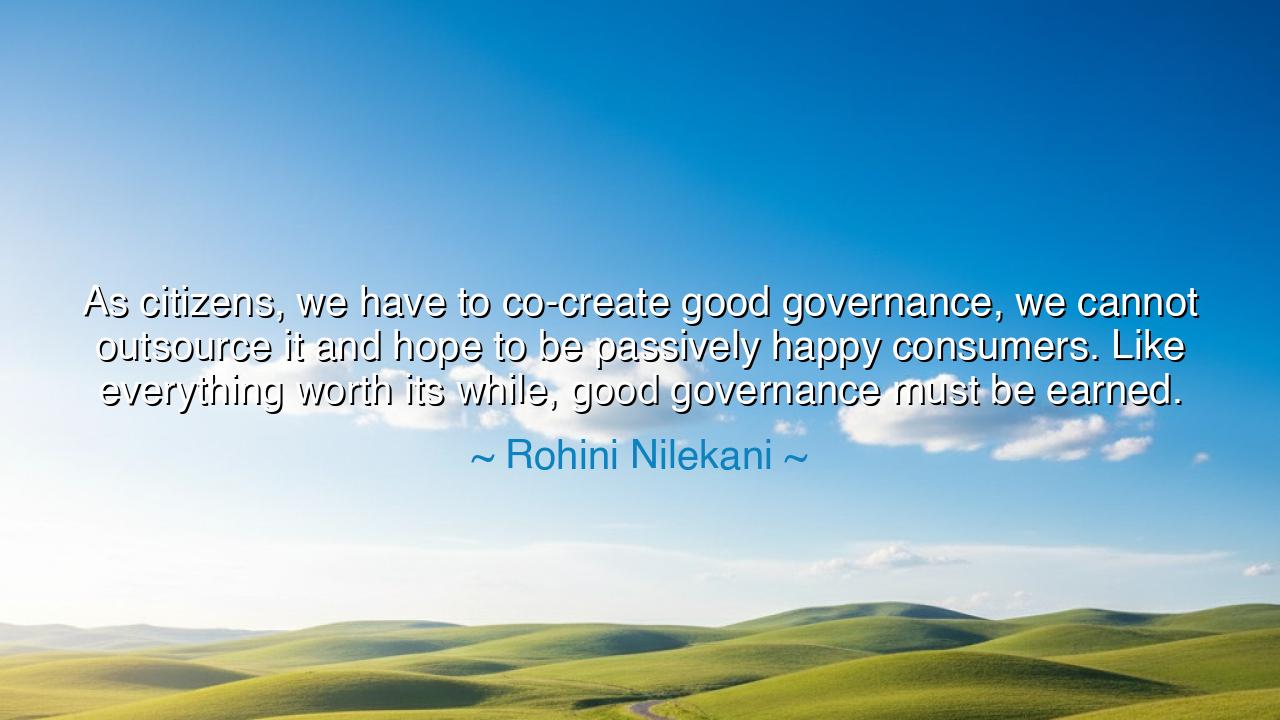
As citizens, we have to co-create good governance, we cannot
As citizens, we have to co-create good governance, we cannot outsource it and hope to be passively happy consumers. Like everything worth its while, good governance must be earned.






“As citizens, we have to co-create good governance, we cannot outsource it and hope to be passively happy consumers. Like everything worth its while, good governance must be earned.” Thus spoke Rohini Nilekani, a thinker and philanthropist whose voice rises in defense of the sacred bond between the people and the state. Her words are not merely about politics—they are a call to responsibility, a reminder that freedom, justice, and harmony are not gifts bestowed by rulers, but labors shared by all. In this saying, Nilekani revives an ancient truth: that the strength of a nation lies not in its laws alone, but in the virtue and vigilance of its citizens.
In her words, there beats the same wisdom that once guided the republics of Greece and Rome. When Nilekani warns that we cannot “outsource” good governance, she speaks against the modern temptation of apathy—the belief that government is a distant machine, to be judged but never joined. Too often do men and women retreat into comfort, content to complain but unwilling to act. Yet democracy, like a living body, survives only when every limb moves with purpose. To expect good governance without participation is to wish for harvest without sowing, to dream of light without tending the flame. Citizenship is not consumption—it is creation.
In her homeland of India, a civilization that has long understood the balance between duty and right, Nilekani’s words recall the teachings of Mahatma Gandhi, who proclaimed that “the best way to find yourself is to lose yourself in the service of others.” Gandhi taught that self-rule (Swaraj) was not merely political independence, but moral awakening—the collective effort of individuals who govern their own conduct before seeking to govern a nation. Nilekani extends this heritage into the modern age, reminding us that governance cannot be the burden of a few elected souls, but the shared labor of every heart that calls itself free.
History abounds with examples of what happens when people forget this truth. Consider the fall of the Roman Republic, once the pride of civic virtue. In its early days, citizens took up arms not only in battle but in debate; they built their laws, served in office, and placed the good of the republic above their private gain. But as wealth and luxury spread, the people grew idle and indifferent, leaving governance to a few ambitious hands. The Senate became corrupt, the people complacent, and tyranny rose where once freedom thrived. The lesson endures through ages: where citizens abdicate their responsibility, power decays into domination.
The meaning of Nilekani’s quote, therefore, is not confined to the realm of politics—it speaks to the very essence of human stewardship. Every form of order, from the smallest family to the largest nation, is sustained only by the willingness of its members to contribute. To “co-create good governance” is to engage, to question, to serve, and to uphold truth even when it is inconvenient. It means participating in public life, nurturing transparency, and demanding justice with both voice and example. It means rejecting the easy role of a “passively happy consumer” and embracing the harder, nobler task of being a citizen—one who gives as much as they receive.
For Nilekani, good governance is not a luxury of the few, but a covenant of the many. It cannot be purchased with taxes or secured by votes alone—it must be earned through compassion, dialogue, and accountability. Just as a garden must be watered and weeded to remain fertile, so too must a society be tended by the care of its people. Where citizens are engaged, the soil of the nation yields peace and prosperity; where they are indifferent, corruption grows like a wild vine, choking the roots of democracy.
The lesson, my listener, is clear and timeless: freedom requires participation. Do not wait for others to build the world you desire—build it yourself, with your voice, your labor, your conscience. Attend to the needs of your community; speak truth to power; hold leaders accountable, but also hold yourself accountable. Be not a spectator in the theater of governance, but a co-author in its unfolding story. For when citizens rise in unity and integrity, governance becomes not an institution above them, but a living reflection of their shared will.
And so, as Rohini Nilekani reminds us, good governance must be earned. It is the daily act of faith by which a people sustain their future. It is a sacred partnership between government and governed, forged in trust and tempered by vigilance. Let us, then, not dream of better nations as idle






AAdministratorAdministrator
Welcome, honored guests. Please leave a comment, we will respond soon